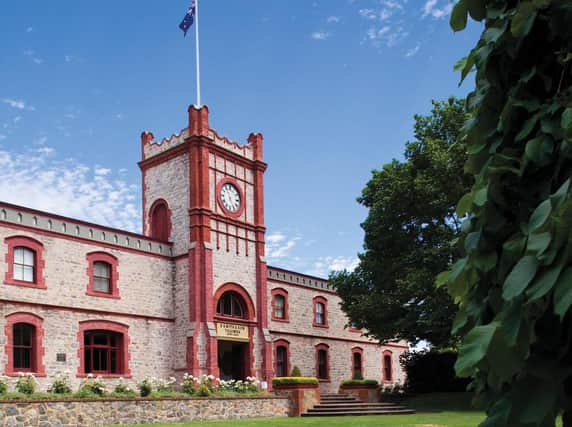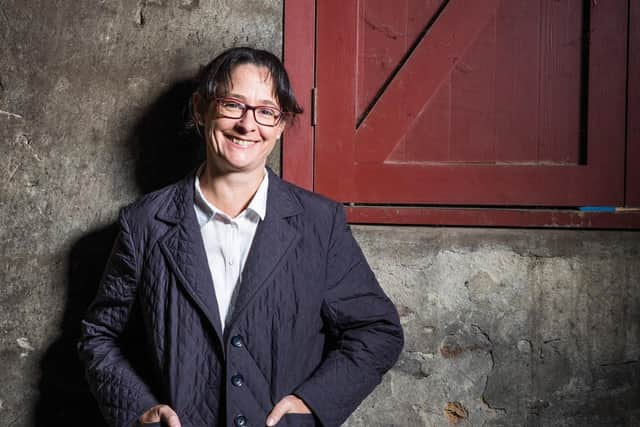Australian winemaker Yalumba has helped make Viognier one of most popular white grape varieties in world - Christine Austin


Those lonely vines were in Condrieu, by the river Rhône in France, and they were the remnants of a much larger vineyard which had diminished over centuries, mainly because the land was steep and difficult to work. But it was here, on a bend of the river, where the sun shone on the vines all day, that the most magical, perfumed, apricot-scented wines were made.
It seemed that this almost-unknown variety would become extinct, until vineyards in the New World decided to experiment. In 1980, from just three plants that were sent from France to an agricultural research station in Australia, Yalumba planted its first Viognier vines.
Advertisement
Hide AdAdvertisement
Hide AdIt chose to plant the grape in the relatively cool Eden Valley, in the eastern part of the Barossa in South Australia and I remember visiting that vineyard on my first trip to Australia. To be honest, I thought they were quite deranged to plant a variety that very few people knew or could even pronounce. That was the era when the world wanted double-oaked, splinter-filled Australian Chardonnay, and no one drank Viognier. How the world of wine moves forward.


It has taken decades of work but Viognier is definitely no longer on the endangered list. It is grown in most wine regions of the world and you can pick up Viognier wines from Argentina, Canada, New Zealand and South Africa, as well as a huge number from the Languedoc, where it seems to have settled in rather well. In Australia there are many producers of Viognier but Yalumba is the company and Louisa Rose is the winemaker who together have put their stamp of individuality on this variety.
Louisa joined Yalumba in 1992 and she freely admits that her first attempts with Viognier were not a success. “I treated it like a Riesling, picking it early and fermenting it at low temperature. But Viognier needs the sun, to the point where the grapes can be a little shrivelled.”
The vines grow with a sprawling canopy that provides some shade for the grapes. After picking, the grapes are pressed directly into the fermentation vat and the indigenous yeasts get to work. “We get a much better result with a wild fermentation than with commercial yeast,” said Louisa.
Advertisement
Hide AdAdvertisement
Hide AdThere are several Viogniers in the Yalumba range, each one produced in a different way, or from a different site, and each one picking up elements of the flavour of the varietal, but the one that has done most to make the variety popular is the straightforward Y Viognier.
This is the easily affordable entry- level Viognier, selling for around £8.50 from Morrisons and Sainsbury’s, although it can go under £8 on offer. It has clear, bright apricot and pear fruit, with a clear touch of honeysuckle and spice. It is a go-to example of how Viognier should taste.
When asked what food Viognier goes with Louisa was hesitant. “It is difficult to think of a food that Viognier doesn’t go with. I like it particularly with Middle Eastern spices.” I agree with Louisa’s comment because after tasting through the range, I was left with three bottles of Viognier and I drank them over several nights, with fish, chicken, crispy duck pancakes, and one of them I just enjoyed as an aperitif. Viognier is an amazingly versatile grape, and that is why it is a very good thing that it was not allowed to go extinct back 50 years ago.
Yalumba is one of the more established wine companies in Australia. Still family-owned, it was founded by a brewer from Dorset named Samuel Smith who emigrated to Australia in 1849. Within a short time and after a bit of luck in finding £300 worth of gold in the new goldfields of New South Wales, he bought 80 acres of land, two horses and a harness. Just a few years later he was winning medals for his wines.
Advertisement
Hide AdAdvertisement
Hide AdThe name of his winery, Yalumba, means “the land all around” and, while that was very apt in the mid-1800s, it is even more relevant now as Yalumba has expanded its vineyard across several regions. It also works with other farmers to obtain particular varieties and nuances of flavour from different regions.
The range is huge, stretching from great- value supermarket wines to hard-to-find special cuvées that mature and develop over many years, and I have to say that I find them consistently good. Here are some of my favourites:
Yalumba Y Viognier 2019, Sainsbury’s, Morrisons, £8.50: Great value, typical apricot and pear flavours with a rounded, broad finish.
Yalumba Organic Viognier 2019, Field & Fawcett, £10.75: A positive, rounded textured wine with honeysuckle and blossom aromas, peachy and lemon flavours and a savoury, almost saline note on the finish. Try it with herb-spiked roast chicken.
Advertisement
Hide AdAdvertisement
Hide AdYalumba Eden Valley Viognier 2017, Latitude Wines £15.99: This wine shows the freshness of the site and the age of the vines. It has depth of flavour, with complex layers of fruit, backed by a streak of citrus and a bite of phenolics, which make this a real joy to team with food.
Yalumba The Virgilus Viognier 2017, Eden Valley, around £35, difficult to find: Just 500 cases are made each year, by selecting the very best barrels of Viognier. I tasted the 2017, and it was ripe and fresh with herbs and spice adding to the clear apricot and pear fruit with white pepper adding to its profile. It was delightful but still had years to go.
Yalumba Y Tempranillo 2019, Majestic, £8.49 (mix-six deal): Another imported grape, this time Tempranillo from Spain, which does remarkably well in Australian sunshine. Full of raspberry and blueberry fruit with just a twist of spice on the finish.
Yalumba Bush Vine Grenache 2018, Latitude £15.99: A bright, lively style of Grenache with raspberry fruit dusted with black pepper and a crunchy fresh finish. Perfect with lamb kebabs.
Advertisement
Hide AdAdvertisement
Hide AdEditor’s note: first and foremost - and rarely have I written down these words with more sincerity - I hope this finds you well.
Almost certainly you are here because you value the quality and the integrity of the journalism produced by The Yorkshire Post’s journalists - almost all of which live alongside you in Yorkshire, spending the wages they earn with Yorkshire businesses - who last year took this title to the industry watchdog’s Most Trusted Newspaper in Britain accolade.
And that is why I must make an urgent request of you: as advertising revenue declines, your support becomes evermore crucial to the maintenance of the journalistic standards expected of The Yorkshire Post. If you can, safely, please buy a paper or take up a subscription. We want to continue to make you proud of Yorkshire’s National Newspaper but we are going to need your help.
Postal subscription copies can be ordered by calling 0330 4030066 or by emailing [email protected]. Vouchers, to be exchanged at retail sales outlets - our newsagents need you, too - can be subscribed to by contacting subscriptions on 0330 1235950 or by visiting www.localsubsplus.co.uk where you should select The Yorkshire Post from the list of titles available.
Advertisement
Hide AdAdvertisement
Hide AdIf you want to help right now, download our tablet app from the App / Play Stores. Every contribution you make helps to provide this county with the best regional journalism in the country.
Sincerely. Thank you.
James Mitchinson
Editor